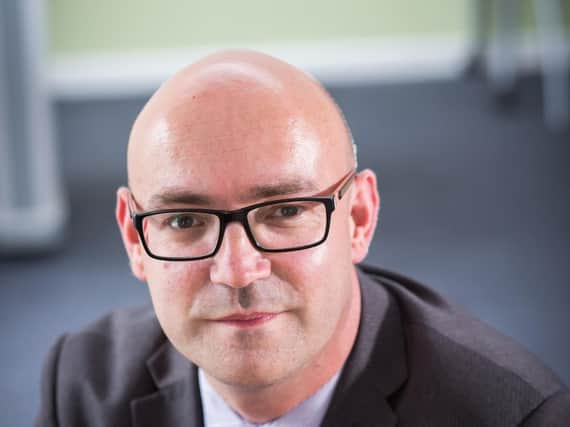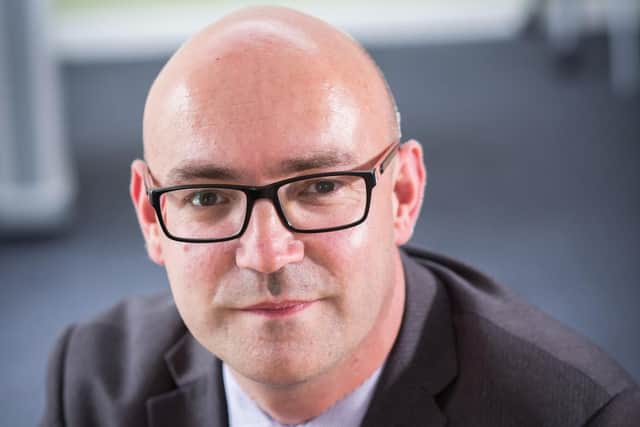Leeds parents urged to limit time children spend on social media


Professor Jonathan Glazzard, who runs a UK first child mental health centre of excellence at Leeds Beckett University, is also advising families that one gadget-free day every week would be beneficial.
He made the comments during Children’s Mental Health Week, which runs until Sunday.
Advertisement
Hide AdAdvertisement
Hide AdThe YEP’s #SpeakYourMind campaign for 2019 will focus on children’s mental health.


Professor Glazzard heads up the UK’s only university mental health centre at Leeds Beckett, which researches and lectures about the mental health of schoolchildren, teachers and trainee teachers.
He has co-written a book called Social Media and Mental Health in Schools.
Prof Glazzard said parents should set children a limit of no more than two-hours screen time per day on social media sites.
Advertisement
Hide AdAdvertisement
Hide Ad“They (social media sites) can have a detrimental effect,” he said. “Social media can cause anxiety and depression and body image concerns.
“Children and young people start to make comparisons between their bodies and some of the idealised bodies they see online.
“A high proportion of children experience cyberbullying online and children can be exposed to distressing content.
“I’m not suggesting parents should monitor their children all the time, but set ground rules.
Advertisement
Hide AdAdvertisement
Hide Ad“Not using technology in bedrooms, I think that is reasonable.
“Sleep deprivation is a problem with young people, because they are on their phones all night.”
Professor Glazzard said it would be a good idea for families to have one day per week without phones or tablets.
“Because they (children and young people) are so connected to technology, they are missing out on social interactions, which are important for their wellbeing,” he said.
Advertisement
Hide AdAdvertisement
Hide AdProfessor Glazzard said parents have a responsibility to educate their children about the safe and responsible use of social media.
He added: “The problem is that young people’s technological skills are far more advanced than those of their parents.
"This places an onus on parents to up-skill themselves so they have the digital capability to support their child.”
Meawhile, The Mini Mermaid and Young Tritons charity is promoting positive mental health among children at primary schools across Leeds.
Advertisement
Hide AdAdvertisement
Hide AdIt has worked with around 300 children during programmes to help them understand the connection between physical and mental health.
The charity’s executive director Hannah Corne said Mini Mermaid courses are designed to boost girls’ self esteem, resilience and confidence.
She said Young Tritons programmes teach boys about emotional resilience, the importance of talking to each other and that strength can be more than physical.
Ms Corne said that the sessions help youngsters improve physical and mental wellbeing and counter pressure about how young people should look, feel and behave.
She said social media is covered in the courses.
Advertisement
Hide AdAdvertisement
Hide Ad“We look at what is and what isn’t true,” said Ms Corne. “Children are exposed to so much social media these days that it is difficult for them to navigate what is true and what isn’t true.
“We teach them to look at something objectively and think about the bigger picture. Social media is going to stay around so what we need to do is work with it and teach children that what they see on social media isn’t always true.”
The Jane Tomlinson Appeal is continuing to back the charity.Ms Corne of Moortown, who started the charity in Leeds in 2015, said the Jane Tomlinson Appeal has provided financial backing since 2017.
She said: “It has been vital, without their support we wouldn’t have been able to connect with so many children.”
Advertisement
Hide AdAdvertisement
Hide AdAny parent worried about their child’s mental health and who needs help or support can call the NSPCC helpline on 0808 800 5000.
Children who want to discuss any concerns can contact Childline free on 0800 1111.
Contacting Childline is confidential and you do not have to give your name if you don’t want to.
The NHS Leeds MindMate website - at www.mindmate.org.uk - provides mental health and emotional wellbeing advice and information for young people in Leeds as well as for parents and carers.